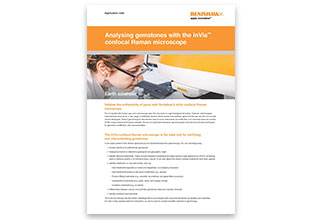Por el momento, esta página no está disponible en español. Puede obtener una traducción automática mediante la opción de traducción de Google.
No podemos responsabilizarnos de este servicio puesto que podemos no verificar los resultados de la traducción.
Si desea más información, póngase en contacto con nosotros.
Analyse gems with Raman and photoluminescence spectroscopy
The Renishaw inVia confocal Raman microscope has been adopted as the instrument of choice by many of the world's gemmology laboratories.
An ideal tool for gemmology
- Certify gem authenticity and determine whether natural, synthetic or treated
- Determine whether gem fissures have been disguised with fillers
- Identify solids, liquids, and gaseous inclusions
- Identify mineral crystal types
- Study crystal defects, vacancies and substitutions with Raman or photoluminescence imaging
- Analyse inclusions, even when they are deep inside the gem
In addition, Raman spectroscopy is a non-destructive technique, so your gems and minerals are not damaged.
An easy tool to adopt
Renishaw's inVia confocal Raman microscope complements traditional petrographic analysis techniques and can obtain both Raman and photoluminescence images and spectra.
It uses an optical microscope—that will be familiar to gemmologists—and can support all the standard viewing methods (transmitted or reflected light, polarised light). Taking a spectrum involves simply focusing on your sample. inVia is highly automated and takes care of the complexity.
Gemstone identification
You can easily identify gemstones with Renishaw's Inorganic Materials and Minerals spectral database. Distinguish between diamond, moissanite, and other materials in seconds.
Detect adulteration
You can spot adulterated gemstones with Raman spectroscopy.
inVia's high spatial resolution and long working distance objective options enable you to see epoxy and other fillers in cracks, even if microscopic.
You can also detect heat and irradiation treated gemstones. A good example of this is the detection of the high-pressure high-temperature treatment of diamonds to modify their appearance.
Investigate inclusions
Easily determine the composition of inclusions and visualise their 3-D shape with StreamHR™ fast confocal volume imaging. You can analyse not only solid inclusions, but liquid and gaseous inclusions too.
We're here when you need us
To find out more about this application area, or an application that isn't covered here, contact our applications team.
Contact our applications team
On-demand webinar:
Raman microscopy and micro-photoluminescence - extraordinary tools in the gemmologist's hands
In this webinar we will illustrate through examples and real cases and the many analysis techniques available. Raman and photoluminescence spectroscopies have become the best techniques for the certification of gemstones.
Watch the webinar
Latest gemmology news
Raman spectroscopy: an advanced technique for gemstone analysis
The National Gemstone Testing Centre (NGTC), China, is using Renishaw's high performance inVia confocal Raman microscopes to perform non-destructive identification and characterisation of gemstones.








